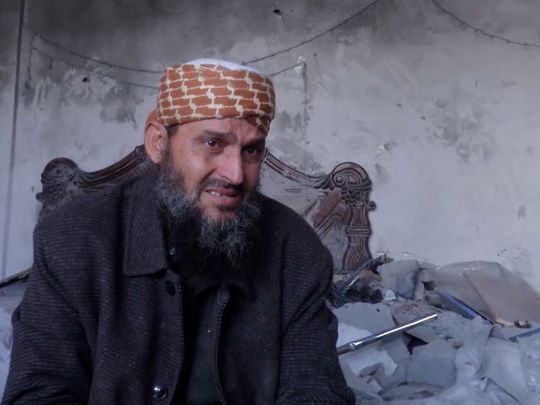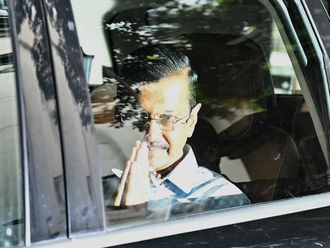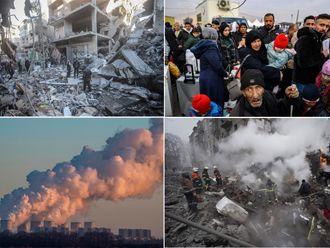
When his love was bereft of its object, he knew he had lost the soul of his soul. That conviction thematically anchored the tragic saga of Khaled Nabhan, a grandfather who once lived with his extended family in the Nuseirat refugee camp in Central Gaza.
It was obvious to all those who knew Nabhan that the way he doted on, cherished and so ardently loved his 3-year-old granddaughter Reem — often excessively — was the driving force in his life. There’s the picture of Nabhan, that surfaced later in the saga, taken shortly before Israel launched its genocidal war on Gaza, of him holding Reem close to his chest and of her looking up at him with an innocent child’s smile, a smile that radiated pure joy, a smile that would’ve melted the coldest of cold hearts.
In November last year, during the early stages of that war, as Israel began its indiscriminate bombing campaign across the length and breadth of the Strip, it targeted, along with homes, multistorey residential buildings, schools, hospitals, marketplaces, mosques and all standing infrastructure, densely populated refugee camps, including here the Nuseirat camp. There, Reem was killed alongside her 5-year-old brother Tareq in a strike that hit the family home in the middle of the night, reducing much of it to rubble.
Immeasurable sorrows
At the time, CNN ran a picture of the Gazan grandfather cradling the lifeless body of his granddaughter — while kissing her sandy hair and caressing her bruised, bloodied cheeks — that went viral, garnering global attention. In the picture, Nabhan’s face, contorted by deep lines of anguish, seemed to convey the raw sense of despair felt and the immeasurable sorrows endured by Gazans everywhere in their enclave.
‘She was my love, my heart, my eyes’
The news story that accompanied the photo at the time told of how Nabhan chose to remember Reem. “She filled my days with happiness”, he said, the profound grief he felt seeming to effortlessly move him to invoke poetic metaphor in his eulogy. “She was my love, my heart, my eyes, the soul of my soul”.
The image went viral and tugged at the heartstrings of people around the world because, one imagines, it embodied the mass suffering — and that suffering indeed began at the early stages of the war — endured by a people huddled defencelessly in their narrow strip of land, with no way around, through or out of it open to them.
Alas, fourteen months into that war and Gaza remains a Guernico landscape of destruction. Alas also because after fourteen months of the horror that mass suffering has become not only difficult to comprehend but difficult for people watching it to continue paying attention to, even caring about.
After a time, surely, we become psychically numb, driven to regulate our emotions, to abstract what we watch, what we read about, what we hear said, in order to avoid the guilt we feel about being, as we say, “unable to do anything about it”.
Mohammad Durrah case
And the more we feel that way, the less empathy we harbour, even though that picture of Khaled Nabhan mourning the death of his beloved grandchild, the soul of his soul, continues to resonate around every corner of our being, much as other pictures like it have done over the years, such as, say, the harrowing 59-second footage taken by a France 2 videographer of 12-year-old Mohammad Durrah, who was shot dead by Israeli troops on September 20, 2000, during the Second Intifada, as he crouched beside his father — who was seen holding close to him — behind a pile of concrete cylinders, while the elder Durrah repeatedly pleaded with them not to shoot. “There is a child here, there is a child here”, he could be heard hollering. In vain.
The last seconds of the video showed the boy crying and the father waving, then a burst of gunfire and dust, with Mohammad shown slumping forward, mortally wounded.
That image also was destined to garner global attention and to be deposited in the world’s memory bank much as that of Khaled Nabhan cradling the lifeless body of his granddaughter had done in November last year.
Laid to rest
On Monday, the Israeli military again bombed Nuseirat, killing and wounding dozens. Khaled Nabhan, still a resident of the camp, was killed by a tank shell as he ran to help people injured in the attack. He was later buried alongside Reem, the soul of his soul.
Khaled Nabhan symbolised the archetypal Everyman, any and every ordinary Palestinian who knows that he or she is manifestly destined to soon die — sooner than one’s time — living as they do in that tormented strip of land we call Gaza.
Rest in peace, brother Khaled.
Fawaz Turki is a noted academic, journalist and author based in Washington DC. He is the author of The Disinherited: Journal of a Palestinian Exile.


_resources1_16a45059ca3_small.jpg)







